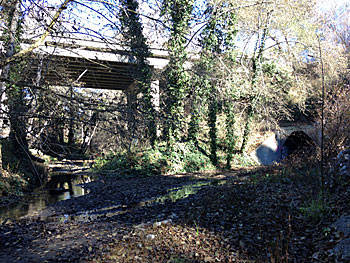By Kevin Newhouse

This wasn’t the first time I’ve been asked this question. Not by a long shot. In fact, the pronunciation of Aptos is one of the two most frequent questions I receive. The other is, “What does Aptos mean?” There is no quick and certain answer for either question but let’s start by looking at the meaning of Aptos and then we can look at the pronunciation.
Truth be told, there is no definitive evidence of the true meaning of Aptos. However, all sources agree that it is derived from an Indian word. In fact, Aptos is one of just three contemporary place names in Santa Cruz County the can be traced back to local Indians. The others are Soquel and Zayante.
One of the most common beliefs is that Aptos means “the meeting of two streams,” “where the waters come together,” or some variation of that phrase. The two bodies of water are known today as Valencia and Aptos Creeks. They come together at a point below today’s Highway 1 overpass at Spreckels Drive, which is in close proximity to the village where the original people of this area lived. In a conversation with Aptos History Museum Director John Hibble, Anne Bass, (born March 1, 1919 to long-time residents Paul Johnston and Christina Jensen), told, that “meeting of the streams” as the meaning of the word “Aptos” was well known even when she was a child.
On April 8, 1880, the Watsonville Register-Pajaronian printed a clip claiming that Aptos was named after “the last Indian who trod these fields before going to his new, happy hunting ground. Aptos was said to be upwards of 120 years old and the last descendant of the first families of California.”
Alfred Kroeber, an American cultural anthropologist whose work focused on collecting cultural data on western tribes of Native Americans, wrote in 1916 that Aptos might be derived form the Spanish word “apto”, meaning skillful.
There are a few other theories (some more interesting than others) but none of which are true.
Personally, I believe the meaning of Aptos is a combination of “the people” and “the meeting of two streams.” Patrick Orozco’s explanation is very consistent among the pattern of other Indian tribe names. However, many of the old-timer residents claim that “meeting of two streams” is the true meaning and many of them are not far removed from the first non-Indian residents who would have had first hand experience with the Indians and their language. As an educated guess, which is only a theory and not to be taken as the absolute truth, I believe “Aptos” translates to “the people who live at the meeting of two streams.”
So now that we know the different theories on the meaning of Aptos, let’s look at how it is pronounced.
The pronunciation of Aptos is debatable between three versions: “ap-toss,” “ap-tose,” and “ap-tiss.” The first two pronunciations are more common but some of the old-timers still pronounce it “ap-tiss.” Although most people, including me, pronounce it “ap-toss,” it was first written down by the Spanish and in Español the “o” would be long, favoring the pronunciation, “ap-tose.”
The absence of any documentation, and the uncertainty of the word’s origin, makes it impossible to know for sure the correct pronunciation. So, don’t let anyone convince you that you are saying it wrong…unless you are really butchering it!
I have been asked about the origin and pronunciation of Aptos not only by newcomers but also by long-time local residents. I am always so happy to hear people asking questions and wanting to know more about Aptos. After all, it is knowledge of the past that helps us plan for the future.
•••
For more information about the Aptos History Museum, upcoming events, or becoming a member of the museum, please visit www.aptoshistory.org.